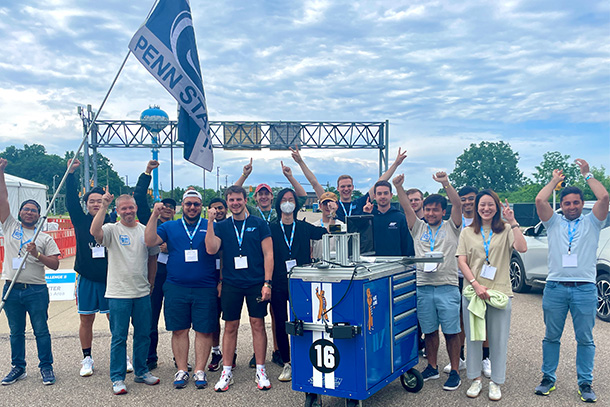
As part of the Autodrive II Challenge, the Penn State Advanced Vehicle Team competed in the first of four annual competitions to design and test an autonomous vehicle. They earned recognition in several categories with their perception card (pictured here, with a few members of the team), a preliminary version of the vehicle. Provided by Greg Westfall.
Penn State students earn multiple wins in international AutoDrive competition
July 22, 2022
By Ashley WennersHerron
UNIVERSITY PARK, Pa. — The Penn State Advanced Vehicle Team (AVT) has finished the first leg of the four-year AutoDrive Challenge II, taking home seven top-three recognitions for their preliminary design and simulation demonstration of an autonomous vehicle. The competition took place June 6-10 in Ann Arbor, Michigan.
“Our team consists of almost 40 undergraduate and graduate students from across Penn State, and we have worked hard since fall 2021 to design and test a perception cart which will act as a test bench for our self-driving car,” said this year’s team lead, Zach Kerr, who graduated with a bachelor’s degree in mechanical engineering this past May. “The experience has been invaluable, and I’m proud of how much we accomplished as the entire AVT learned both the technical and professional skills needed for this level of engineering work. I look forward to seeing how far AVT will take our efforts over the next three years!”
The second iteration of the General Motors- and SAE International- (formerly the Society of Automotive Engineers) sponsored competition, AutoDrive will culminate in 2025, when the 10 student teams test how well their autonomous vehicles can navigate an urban driving course at the University of Michigan’s MCity in Ann Arbor. The vehicles must fulfill the requirements of the SAE Standard Level 4 automation, which does not require human monitoring. For comparison, the automation system used by Tesla is a Level 2 system.
“We concentrated on not just fulfilling the requirements for this year of the competition, but also setting up future members for success,” said Greg Westfall, a rising third-year undergraduate majoring in electrical engineering and math. Westfall will lead the team during the second year of the challenge. “We’ve learned so much this year about the technology it takes to create a Level 4 autonomous vehicle and how to work in a cross-functional team. The amazing group of people that made up the team really set an example for future team members. We did great this year, but we have even higher expectations for the rest of the competition.”
The competition tested the teams’ designs with static events, such as reports and presentations, and dynamic events, such as navigating the proposed system through a traffic light challenge and more on the MCity test track.
“The scores we received in year one will not influence the following years, although the hard work we put in will help us to succeed in year two and beyond,” Westfall said.
Penn State’s team earned the following recognitions in five of the nine individual categories, as well as in two of the overall categories:
- Overall Dynamic Challenges, third place
- Overall Static Challenges, second place
- Concept Design Report & Software Requirements Specifications, first place
- Concept Design Event, second place
- Systems Safety & Technical Report, third place
- Mobility Innovation & 0-0-0 Challenge, second place
- Traffic Light Challenge, third place
“The team did awesome,” said Gary Neal, professor of mechanical engineering and Penn State’s AVT faculty adviser. “The team worked hard all year, but as with many projects, various unexpected challenges appeared at crunch time. These students came together as a real team and bonded in that moment of crisis to successfully overcome the hurdles. They competed in every event and did amazing, considering this was Penn State AVT’s rookie year in this competition.”
SAE International’s social media team collected advice for the next generation of engineers from participants during the competition in June, including from Penn State’s project manager Ahmet Yener, an undergraduate student majoring in electrical engineering. He offered this guidance: “Everything is a work in progress. Anything could go wrong but keep overcoming the challenges.”
In addition to Kerr, Westfall and Yener, the following team members also traveled to Ann Arbor to compete: Devansh Agarwal, third-year student majoring in data science; Felipe Andrade Rubio, fourth-year student majoring in computer science and mathematics; Nikita Arbuzov, who graduated in May with a bachelor’s degree in computer engineering; Ross Timothy Hamilton, who graduated in May with a bachelor’s degree in mechanical engineering; Bhavya Jain, third-year undergraduate student majoring in mechanical engineering; Paul Kerner, who graduated in May with a bachelor’s degree in mechanical engineering; Yifan Li, fifth-year student majoring in electrical engineering; Wilson Marrero Jr., fourth-year undergraduate student majoring in mechanical engineering; Dev Patel, fourth-year student majoring in computer science; Joshua Michael Singler, fourth-year undergraduate student majoring in mechanical engineering; Yao Sun, first-year graduate student pursuing a doctorate in mechanical engineering and Penn State AVT’s graduate research assistant; and ChengNing Zhang, fourth-year student majoring in computer science.
Penn State’s team receives financial support for the competition from the College of Engineering, including from the Thomas D. Larson Pennsylvania Transportation Institute, the Department of Mechanical Engineering, the Department of Electrical Engineering, the Department of Computer Science and Engineering and other sponsors. Individuals or organizations interested in supporting the Penn State AVT may do so through this website.
Students interested in joining Penn State AVT and participating in the AutoDrive Challenge II can learn more by visiting the team’s website.



